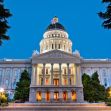For better or worse, California is often a bellwether for the rest of the nation when it comes to regulations and laws and how they can potentially affect both commerce and consumers. For businesses with operations in the nation’s most populous state, one with a Gross Domestic Product that alone ranks it in the top five in the entire world, California’s legislative labor footprint is just as large and outsized as its population and topography.
So, with several new employment laws scheduled to go into effect at the stroke of midnight Dec. 31, the year 2021 is shaping up to be one that could potentially keep lawyers in the Golden State relatively busy and employers up very late at night.
COVID, COVID, COVID
One of the biggest issues of concern to most voters this year, if not the biggest, according to polling data both before and after Election Day, was the COVID-19 pandemic. Thus, it should come as no surprise that coronavirus-related measures are front and center in the minds of California’s state legislators. And, with Governor Newsom affixing his signature to AB 685 this past September, employers need to be aware of a host of new requirements and the possible ramifications of not abiding by them in the coming year.
While Senate Bill 1159, which makes it easier for employees to claim workers’ compensation if there’s a COVID-19 outbreak at work, passed in September as an urgency bill and took effect immediately, AB 685, on the other hand, goes into effect Jan. 1, 2021.
This particular Assembly Bill, requiring employers to notify workers and local public health officials in writing of possible exposure in the workplace to the novel coronavirus, subjects businesses to state penalties for noncompliance. The new law also gives Cal/OSHA expanded authority to shut down operations where COVID-19 may be present due to exposure. The measures in AB 685 will remain in place until January 1, 2023, when they will sunset.
Wage and Hour Laws Addressed as Well
Though a big part of the changes for employers next year are COVID-19 related, that’s not the case for them all. New laws regarding a range of areas from family and medical leave to pay gap data and worker classifications will all debut next year in the workplace.
Senate Bill 1383, for example, bridges a gap between large state employers and their smaller counterparts concerning family and medical leave. Whereas before, only companies with 50 or more employees had to provide at least 12 weeks of approved leave to employees wishing to care for sick family members or newborn children, that number is now being reduced to as low as five, if requested by workers.
Having been a political hot potato for years in California and the nation, but especially in the last few election cycles, the topic of workers, specifically women and people of color, being paid less than their male and white counterparts has resulted in repeated and amplified attempts at making sure workers are paid the same amount for the same job, regardless of background. S.B. 973 addresses some of these concerns.
With a deadline of March 31, 2021, and by this same date each year, employers with at least 100 employees and which already file an Employer Information Report annually under federal law, must now also file an equal pay report to the California Department of Fair Employment and Housing (DFEH). If not voluntarily provided, DFEH could seek a court order demanding compliance.
Also of note, California’s minimum wage laws change at the beginning of 2021. Depending on if a business has more or fewer than 26 employees, the minimum wage could be either $13 or $14 an hour. Minimum wages could potentially be higher in various municipalities.
For a better look at some of the laws in the new year that could affect you as a business or an employee, visit the California Department of Industrial Relations https://www.dir.ca.gov/dlse/ and the California Department of Labor and Workforce Development Agency https://www.labor.ca.gov/.






